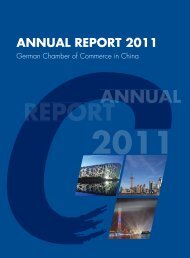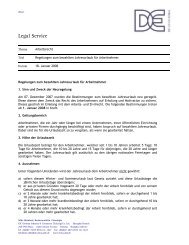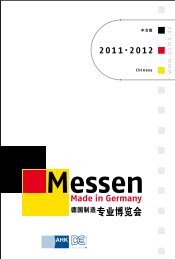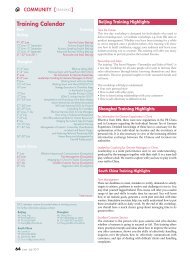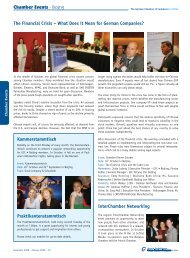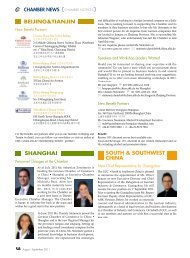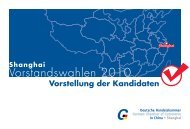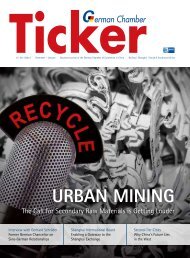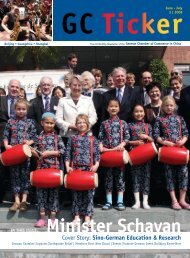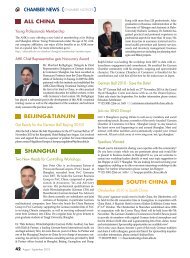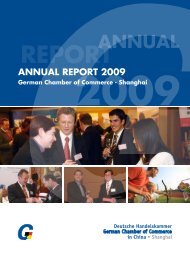Minister Steinmeier - AHKs
Minister Steinmeier - AHKs
Minister Steinmeier - AHKs
Create successful ePaper yourself
Turn your PDF publications into a flip-book with our unique Google optimized e-Paper software.
The German Chamber of Commerce in China<br />
urban development, but also showed that cooperation between Chinese<br />
and German institutions, companies, universities and government entities<br />
is already well underway. <strong>Minister</strong> <strong>Steinmeier</strong> opened the ‘Chongqing<br />
Dialogue on Urbanization,’ a major event of the “Germany and China –<br />
Moving Ahead Together” series.<br />
During the events, former German Federal <strong>Minister</strong> Klaus Töpfer gave<br />
an insightful speech honoring Chongqing as the municipality that had<br />
brought industrialization to West China. However, industrialization<br />
brings both economic progress and environmental challenges with it.<br />
<strong>Steinmeier</strong>’s opening remarks analyzed the way in which the expressions<br />
“mega cities” and “urbanization” are often code words for problems<br />
rather than solutions. He stressed that in cases such as Chongqing,<br />
“urbanization becomes globalization under a magnifying glass.” Accordingly,<br />
global cooperation becomes vital to confront the challenges of<br />
urbanization.<br />
<strong>Steinmeier</strong> mentioned substantial investments from German companies<br />
in the region and indicated his willingness to accept Germany’s<br />
support in urban planning, calling it beneficial for the creation of “a<br />
livable environment for the people.” 50% of the municipality’s surface<br />
area is to become green. This advancement reflects the ideas of Prof.<br />
Ümüt Halik (Xinjiang University) who showed - based on the example of<br />
Urumqi - that regarding a city as an ecological system is a rather new<br />
but life-saving approach in our fast developing world.<br />
Mr. Martin Brudermüller (BASF) began the panel on “Visionary Long-<br />
Term Planning” by underlining the responsibility of urban planners,<br />
architects and designers to take environmental sustainability into consideration.<br />
In a later keynote, the German Chamber of Commerce in<br />
China • Beijing’s Jutta Ludwig pursued a complementary theme, arguing<br />
that private companies influenced the urban scene more than any other<br />
stakeholder with their decisions on location, staff and production facilities<br />
capacity. Enterprises must take responsibility, she said.<br />
Resource Management Plays a Key Role<br />
Focusing on the topic of urbanization, <strong>Minister</strong> <strong>Steinmeier</strong> acknowledged<br />
that responsible handling of resources is the job of both governments<br />
and companies. He specifically highlighted the importance of<br />
energy efficiency and water management.<br />
During the “Energy Efficiency and Transport” panel, Ulrich Walker (Daimler<br />
Northeast Asia) drew attention to the decreasing availability of resources<br />
at a time when the world’s population, and therefore demand for<br />
resources, is increasing. Panelists discussed possible solutions. Increasing<br />
fuel prices and providing energy-efficient vehicles was one strategy<br />
Jutta Ludwig in Chongqing<br />
© Goethe-Institut Peking/Jiang Ziwei<br />
proposed by Dr. Peter Kilgenstein (Bosch). Such efforts can be complesmented<br />
by the use of biodiesel and hydrogen-powered cars in future, as<br />
noted by Ren Xiaozhang (China Automotive Engineering Institute).<br />
The very nature of transportation networks is also not to be forgotten,<br />
as they play a key role in energy consumption rates. Dirk Hoke (Siemens)<br />
and Professor Shao Yiming (Traffic & Transport Institute of Chongqing<br />
Jiaotong University) pointed to better traffic and transport management,<br />
and advocated improving railway transport with an energy-saving<br />
mobility model.<br />
In another panel, “Environment and Water Protection”, moderator<br />
Claudia Wanner, (Financial Times Germany), involved the audience<br />
in a controversial discussion on the 4-action-plan (blue sky, green<br />
water, green land, serenity) introduced by Prof. Xu Zhonghua (Chongqing<br />
Water Resources Programming & Planning Institute). Participants<br />
debated various methods of implementing environmental protection<br />
programs. Dr. Roland Winkler (econet china), Prof. He Qiang (CQ Municipal<br />
Government Committee) and Nicolas Zuber (Herrenknecht) presented<br />
energy efficient alternatives like sustainable building technology,<br />
water transfer and urban planning schemes which integrate water<br />
supply sources.<br />
<strong>Steinmeier</strong> Visits Earthquake Epicenter<br />
<strong>Steinmeier</strong> praised the truly open and rapid manner in which the Chinese<br />
government handled the Sichuan earthquake, calling it a sign of “the<br />
true greatness of the Chinese nation.” Bo Xilai thanked Germany in his<br />
opening speech for the generous donations after the earthquake as well.<br />
Certainly German investment and know-how in infrastructure building<br />
will play an important role in the reconstruction of the earthquake zone.<br />
After offering the German people’s condolences for the victim’s of the<br />
disastrous earthquake again, <strong>Minister</strong> <strong>Steinmeier</strong> announced a German<br />
project which will construct 8 lighthouse schools in Dujiangyan, the<br />
hardest-hit area. German companies such as Bosch, ThyssenKrupp, BASF<br />
and Herrenknecht will take part along with the German government.<br />
Partner schools in Germany have already offered their patronage to<br />
these lighthouse schools, which are to offer safety of construction, topflight<br />
equipment, academic excellence and German language instruction.<br />
Before concluding his trip near the Sichuan earthquake’s epicenter, <strong>Steinmeier</strong><br />
also visited a field hospital donated by the German Red Cross, and a<br />
site where workers of the German Technisches Hilfswerk were laboring to<br />
restore clean water to victims. Germany continues to support the reconstruction<br />
of the earthquake zone, and hopes that by working together the<br />
process can move forward as quickly as possible.<br />
<strong>Minister</strong> <strong>Steinmeier</strong>, Ambassador Schaefer and Ms. Gudrun<br />
Krögel-Schaefer <strong>Minister</strong> Yang, <strong>Minister</strong> <strong>Steinmeier</strong>, Dr. Roth<br />
Cover Story<br />
www.china.ahk.de 11 | August - September 2008<br />
Business Focus




